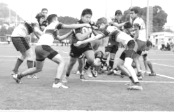ĢāÄæÄŚČŻ
”¾ĢāÄæ”æ¶ĢĪÄøÄ“ķ
¼Ł¶Ī¶ØÓ¢ÓļæĪÉĻĄĻŹ¦ŅŖĒóĶ¬×ĄÖ®¼ä½»»»ŠŽøÄ×÷ĪÄ£¬ĒėÄ抎øÄÄćĶ¬×ĄŠ“µÄŅŌĻĀ×÷ĪÄ”£ĪÄÖŠ¹²ÓŠ10“¦ÓļŃŌ“ķĪó£¬Ćæ¾äÖŠ×ī¶ąÓŠĮ½“¦”£“ķĪó½öÉę¼°Ņ»øöµ„“ŹµÄŌö¼Ó”¢É¾³ż»ņŠŽøÄ”£
Ōö¼Ó£ŗŌŚČ±“Ź“¦¼ÓŅ»øöĀ©×Ö·ūŗÅ(![]() )£¬²¢ŌŚĘäĻĀĆꊓ³öøĆ¼ÓµÄ“Ź”£
)£¬²¢ŌŚĘäĻĀĆꊓ³öøĆ¼ÓµÄ“Ź”£
ɾ³ż£ŗ°Ń¶ąÓąµÄ“ŹÓĆ(£Ü)»®µō”£
ŠŽøÄ£ŗŌŚ“ķµÄ“ŹĻĀ»Ņ»ŗįĻߣ¬²¢ŌŚøĆ“ŹĻĀĆꊓ³öŠŽøÄŗóµÄ“Ź”£
×¢Ņā£ŗ1.Ć擦“ķĪó¼°Ę䊎øľł½öĻŽŅ»“Ź£»
2. Ö»ŌŹŠķŠŽøÄ10“¦£¬¶ąÕߣؓӵŚ11“¦Ęš£©²»¼Ę·Ö”£
One evening after work John drove his secretary home because she failed to start her car. Not want to bother his wife, Maureen, he decided not to mention it to him. Later at that night, John and Maureen were driving out to eat while John spotted a high-heeled shoe hid under the passenger seat. Pointing to anything out of the passenger window to distract the wife, he picked up the shoe and throw it out of his window. They arrived in the restaurant a short time later. When they were about to get out of car,
Maureen enquired, ”°John, have you seen my other shoes?”±
”¾“š°ø”æ
”¾1”æwantøÄĪŖ wanting
”¾2”æhimøÄĪŖ her
”¾3”æat øÄĪŖČ„µōat
”¾4”æwhileøÄĪŖ when
”¾5”æhid øÄĪŖhidden
”¾6”æanythingøÄĪŖsomthing
”¾7”æthrowøÄĪŖthrew
”¾8”æinøÄĪŖat
”¾9”æ¼Óthe
”¾10”æshoesøÄĪŖshoe
”¾½āĪö”æ
ŹŌĢā·ÖĪö£ŗ
”¾1”æwantøÄĪŖ wanting. ¶Æ“ŹwantÓė¾ä×ÓÖ÷Óļhe¹¹³ÉÖ÷¶Æ¹ŲĻµ£¬ĖłŅŌŹ¹ÓĆĻÖŌŚ·Ö“ŹŌŚ¾äÖŠ³äµ±×“Óļ”£
”¾2”æhimøÄĪŖ her. ±¾¾äÖŠherÖø“śJohnµÄĘŽ×ÓMaureen£¬ÖøĖū¾ö¶Ø²»¶ŌĘŽ×ÓĢįµ½Õā¼žŹĀĒ锣
”¾3”æČ„µōat. ¶ĢÓļthis»ņthatŗóĆę½ÓŹ±¼äĆū“Ź£¬ČēnightµČ£¬æÉŅŌµ„¶Ą³äµ±Ź±¼äדÓļ”£ĖłŅŌ±¾¾äÖŠµÄatŹĒ¶ąÓąµÄ”£
”¾4”æwhileøÄĪŖ when. ±¾¾äŹĒŅ»øö¹Ģ¶Ø¾äŹ½be doing something when...ÕżŌŚ×öijŹĀŌŚÕāŹ±...£»whenŹĒŅ»øö²¢ĮŠĮ¬“Ź£¬ŅāĪŖ”°ŌŚÄĒŹ±”±£¬ŗóĆęµÄ¾äÖŠ±ķŹ¾ŅāĮĻÖ®ĶāµÄŹĀĒ锣¾äŅā£ŗJohnŗĶMaureenÕżŅŖæŖ³µĶā³ö³Ō·¹£¬ŌŚÕāŹ±John·¢ĻÖŅ»Ö»²ŲŌŚ×łĪ»ĻĀĆęµÄøßøśŠ¬”£
”¾5”æhid øÄĪŖhidden. ¶Æ“ŹhideÓėĆū“Źshoe¹¹³ÉĀß¼ÉĻµÄ±»¶Æ¹ŲĻµ£¬ĖłŅŌŹ¹ÓĆ¹żČ„·Ö“Ź±ķŹ¾±»¶Æ”£±¾¾äŹ¹ÓĆ¹żČ„·Ö“Ź¶ĢÓļ³äµ±¶ØÓļŠŽŹĪshoe”£
”¾6”æanythingøÄĪŖsomething. ¾äŅā£ŗĪŖĮĖ·ÖÉ¢ĘŽ×ÓµÄ×¢ŅāĮ¦£¬JohnÖø×Å“°ĶāµÄijøö¶«Ī÷”£±¾¾äŹĒŅ»øöæĻ¶Ø¾ä£¬ĖłŅŌŹ¹ÓĆsomething£¬¶ų²»ŹĒanything”£ŅņĪŖanythingĶس£ÓĆÓŚŅÉĪŹ¾äŗĶ·ń¶Ø¾äÖŠ”£
”¾7”æthrowøÄĪŖthrew. ¾äŅā£ŗĖū¼ńĘšŠ¬×ÓČÓµ½“°Ķā”£±¾¾äÖŠŗĶ¶Æ“ŹpickedŗĶthrew¹¹³É²¢ĮŠ¹ŲĻµ£¬ĖłŅŌ¶¼Ź¹ÓĆ¹żČ„Ź½”£
”¾8”æinøÄĪŖat ¶Æ“ŹarriveŹĒŅ»øö²»¼°Īļ¶Æ“Ź£¬±ķŹ¾”°µ½“ļŠ”µŲ·½”±Ź¹ÓĆ”°arrive at...”±£¬µ½“ļ“óµÄµŲ·½Ź¹ÓĆ”°arrive in...”±”£
”¾9”æofŗó¼Óthe. ±¾¾äÖŠµÄcar¾ĶŹĒÖøÉĻĪÄĢįµ½µÄcar£¬ĖłŅŌŹ¹ÓĆ¶Ø¹Ś“Źthe±ķŹ¾ĢŲÖø”£
”¾10”æshoesøÄĪŖshoe. ¾äŅā£ŗJohn£¬Äć擵½ĪŅĮķĶāŅ»Ö»Š¬ĮĖĀš£æŌĄ“JohnČÓ“ķĮĖŠ¬”£øł¾ŻÉĻĪÄæÉÖŖĖūČÓĮĖŅ»Ö»Š¬£¬ĖłŅŌŹ¹ÓƵ„ŹżŠĪŹ½”£


